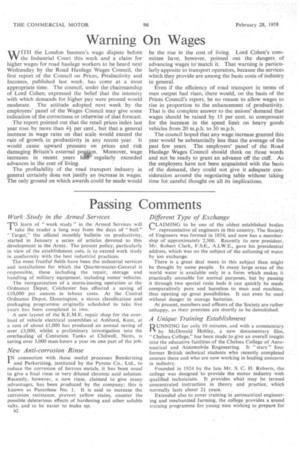Warning On Wages
Page 36

If you've noticed an error in this article please click here to report it so we can fix it.
WITH the London busmen's wage dispute before the Industrial Court this week and a claim for higher wages for road haulage workers to be heard next Wednesday by the Road Haulage Wages Council, the first report of the Council on Prices, Productivity and Incomes, published last week, has come at a most appropriate time. The council, under the chairmanship of Lord Cohen, expressed the belief that the intensity with which demands for higher pay were pressed would moderate. The attitude adopted next week by the employees' panel of the Wages Council may give some indication of the correctness or otherwise of that forecast.
The report pointed out that the retail prices index last year rose by more than 41+ per cent., but that a general increase in wage rates on that scale would exceed the rate of growth in productivity in any recent year. It would cause upward pressure on prices and risk damaging Britain's external po§igpn. Moreover, wage increases in recent years hi!" regularly exceeded advances in the cost of living.
The profitability of the road transport industry in general certainly does not justify an increase in wages. The only ground on which awards could be made would be the rise in the cost of living. Lord Cohen's committee have, however, pointed out the dangers of advancing wages to'match it. That warning is particularly apposite to transport operators, because the services which they provide are among the basic costs of industry in general.
Even if the efficiency of road transport in terms of man output had risen, there would, on the basis of the Prices Council's report, be no reason to allow wages to rise in proportion to the enhancement of productivity. That is the complete answer to the unions' demand that wages should be raised by 15 per cent. to compensate for the increase in the speed limit on heavy goods vehicles from 20 m.p.h. to 30 m.p.h.
The council hoped that any wage increase granted this year would be substantially less than the average of the past few years. The employers' panel of the Road Haulage Wages Council should think on those words and not be ready to grant an advance off the cuff. As the employers have not been acquainted with the basis of the demand, they could not give it adequate consideration around the negotiating table without taking time for careful thought on all its implications.




















































































































